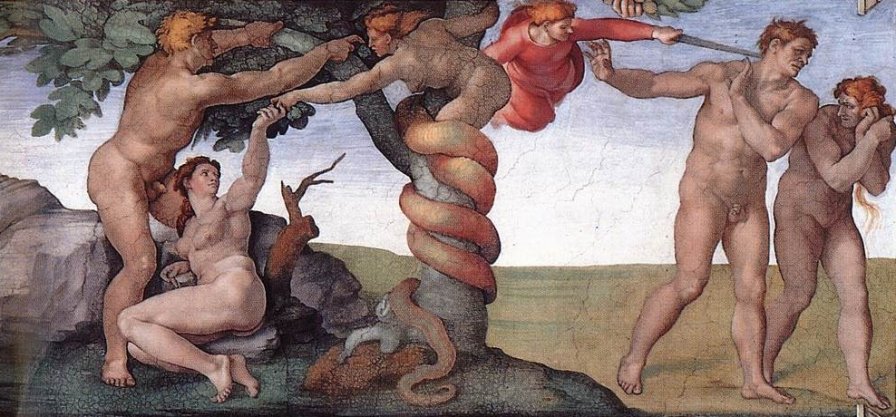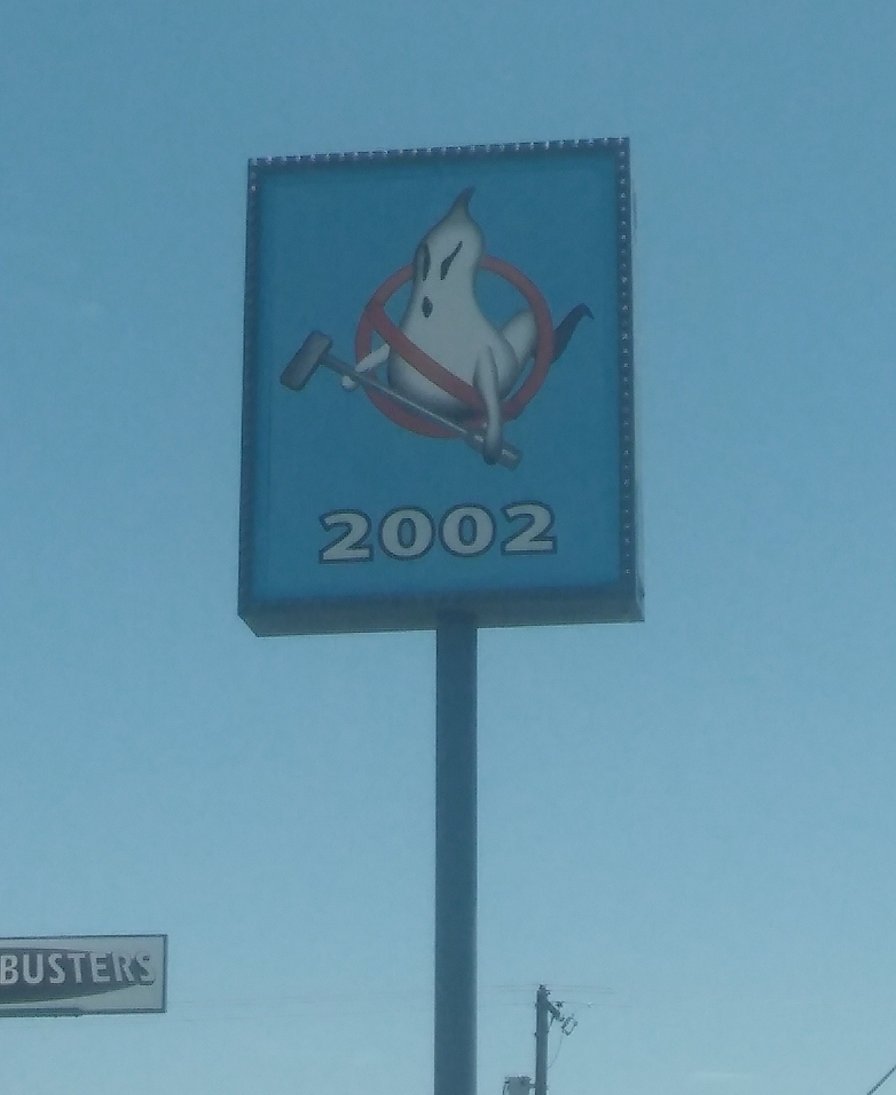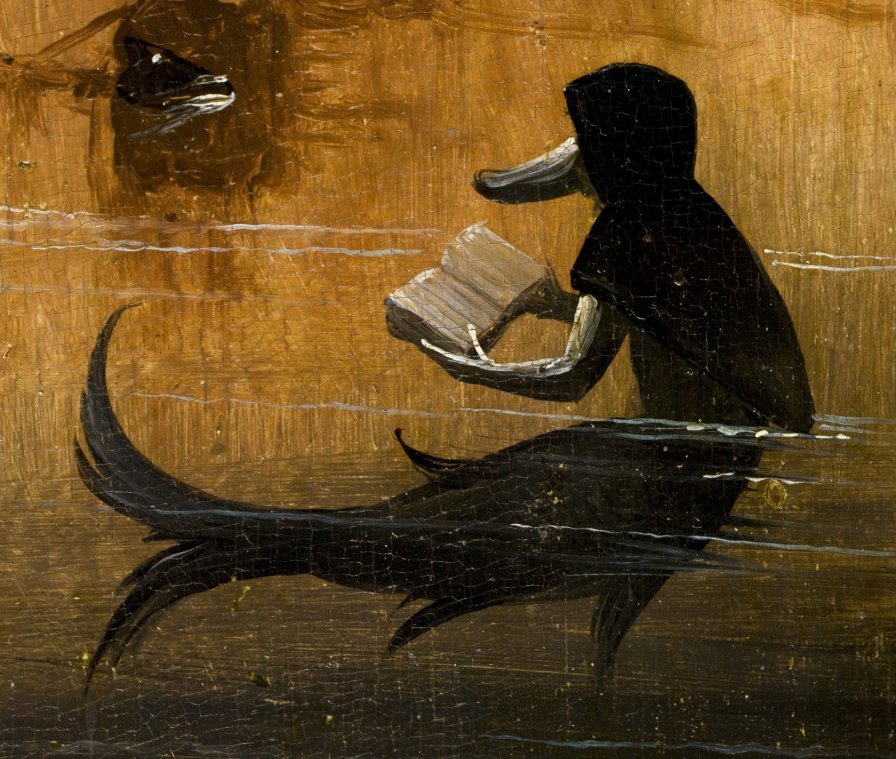The intervention of a god in Greek tragedy — or at the very least an appeal to a god to intervene — often signals the disclosure of an incoherence in moral standards and vocabulary.
— Alasdair MacIntyre, After Virtue
Before Ava
In the background of the third shot of the film, which begins with a montage inside the office of Bluebook, the search engine company founded by Nathan (Oscar Isaac), fish are swimming in a tank. No other living animals appear in the film. Next, we see Caleb (Domhnall Gleeson), a Bluebook employee, looking at his computer monitor. When he picks up his phone, we see his face from the perspective of his phone’s front-facing camera, and we see that the phone is “recognizing” and “reading” his face by tracking temperature patterns and tracing contours. Caleb sends text messages to people who are presumably his coworkers and “friends,” and then we get another shot of his face, this time as it’s “recognized” and “read” by the camera mounted atop his computer monitor. The insinuation is that this phone and this computer are not his, Caleb’s, any more than he is theirs, or rather Bluebook’s. After all, the phone and the computer really do recognize and read Caleb’s face, whereas Caleb neither reads nor recognizes any faces when he looks into his screens — not even the faces of his “friends,” who are represented by generic icons. A woman rushes over and congratulates Caleb, who does not remove his earbuds. He says nothing. He makes eye contact with no one — until just before the cut, when he locks eyes for a second with his computer’s camera, which is the point of view from which we’re watching him.

Caleb rides in a helicopter to the Estate of Nathan, which is so massive that a two-hour flight from its perimeter does not yet reach the residence. Welcome to a sort of Eden and a sort of Canaan. Remember that according to Numbers, Caleb was one of only two spies out of 12 who returned from the Promised Land with his faith intact; the other 10 gave a terrifying report of the enemy’s strength in an attempt to dissuade the people of Israel from invading the land that God had promised them. The milk and honey are no less muddy here: our Caleb is entering the land of the great spy, Bluebook, which spies on everyone who uses its service, including its own engineers.
The helicopter pilot tells Caleb to follow the river. A river flows out of Eden to water the garden (Gen 2.10). In one of many reversals, this river flows into the Estate. When Caleb arrives at the unassuming entrance to the Frank Lloyd Wright-inspired residence, a computer’s voice hails him: “Caleb Smith.” Here is no cherubim or flaming, turning sword to guard the way to the tree of life; here is a console with a screen that will take a picture of Caleb’s face, giving him access to — we shall see. The door closes behind him after he enters, and the console locks it. Caleb has not been driven out, but rather lured in. As he descends a glass-walled staircase, he passes close to a tree that stands just outside the confines of the residence, without glancing at it. Light classical musical emanates from hidden speakers. A pile of chopped wood rests under a concrete sideboard in a disconcertingly precise arrangement. Caleb says “Hello” twice and gets no reply. He follows the sound of fists pummeling a punching bag and finds Nathan on the deck. Nathan greets him exactly as the console did: “Caleb Smith.”
When Nathan explains that he has “the mother of all hangovers,” he misuses the Lord’s name: “Oh my God, like you wouldn’t even believe.” No one in the film will invoke this particular name again. Nathan admonishes Caleb for his social awkwardness, which Nathan attributes to his awe before the grandeur of the Estate, the mountains (upon which no one is praying), and him, Nathan (“Him,” it’s tempting to write). In spite of his casual, down-to-earth posturing, Nathan betrays with every gesture and every word that he has reckoned his net worth and measured his worldly stature.
“Well, I guess the first thing I should do is explain your pass. Now it’s simple enough: it opens some doors and it doesn’t open others. And that just makes everything easy for you, right?” Compare Genesis 2.15 — 7:
The LORD God took the man and put him in the garden of Eden to till it and keep it. And the LORD God commanded the man, “You may freely eat of every tree of the garden; but of the tree of the knowledge of good and evil you shall not eat, for in the day that you eat of it you shall die.”
To follow the word of Saint Paul in Romans 7, this first commandment in Eden presented an opportunity that sin, embodied in the serpent, seized upon to deceive Adam and Eve. Similarly, Nathan’s command is the occasion for its own transgression; the command that promises Caleb restricted access to that which is a gift (but what a poor gift in this case), that to which he would not have access at all if not for the command, will surely conceive in him the desire to flout the command; then, when that desire has conceived, it gives birth to sin, and that sin, when it is fully grown, gives birth to death (James 1.15). As soon as we hear the prohibition, we know that Caleb will eventually open a door that he is not allowed to open. God’s word was honest: Adam could freely eat of every tree in the garden but one — including even the tree of life — for to eat the fruit of the tree of knowledge, the single forbidden tree, would be to lose freedom and fall into the bondage of sin.

Nathan’s tongue, by contrast, is forked: the function of Caleb’s pass is simple enough, but the simplicity is of a kind that does not “just make everything easy,” but rather introduces a difficulty, one which Nathan doesn’t explain because to offer an explanation would be to reveal that he has brought Caleb to the Estate in order to keep him and till him. Caleb is a stranger in Nathan’s house; some doors are “off limits,” which gives the lie to Nathan’s reassurance that some doors are “for him,” since the security system has been designed by Nathan for his own benefit, to secure his good and not Caleb’s. Caleb finds himself in a maze, not a garden, through which he must travel by trial and error.
The room allotted to Caleb, which is indistinguishable from a sleek hotel room, boasts a fridge fully stocked with bottles of water. No plant yielding seed to be had, nor tree with seed in its fruit, neither green plant for food. A stream is indeed watering the whole face of the ground, but Caleb’s room is subterranean. He is in Sheol, and his guide through this inferno is a man somewhat less congenial than Virgil. “This building isn’t a house; it’s a research facility,” Nathan explains pedantically, contradicting what he said two minutes earlier. In other words, this is not even a house, let alone the house of the Lord; it is a place where no one lives, or can live, or should live. Nathan tells Caleb that he wants to share his work with him so much that it’s eating him up inside. Remember what Iago says to Othello in Act 3, Scene 3 of that drama: “I see, sir, you are eaten up with passion. I do repent that I put it to you. You would be satisfied?” And Othello’s reply: “Would? Nay, and I will.” What else is passion that eats a man up, if not sin? When a man lets himself become mere fuel for passion, he is feeding a fire that will reduce him to dust. When Caleb begins reading Nathan’s non-disclosure agreement aloud, he emphasizes the phrase “unlimited access.” Caleb’s access to the facility is limited; Nathan’s access to Caleb’s faculties will not be. Whatever is eating up Nathan will surely eat up Caleb too.
Nathan informs Caleb that he’s brought him here to act as the human “component” in a Turing test. “If that test is passed,” he says, “you are dead center of the greatest scientific event in the history of man.” Make note of that: dead center. Is anyone truly alive at the center of this great event? “If you’ve created a conscious machine, it’s not the history of man,” Caleb replies. “That’s the history of gods.” Paganism is in ascendance.
AVA: SESSION 1
Nathan is sitting naked — in fact only topless, as we will see in a few minutes — before three monitors. He is facing a wall on which are posted hundreds of sticky notes. On the wall to his left hangs Titian’s painting Allegory of Prudence, the irony of which is that this film could have been appropriately (though insufferably) titled Allegory of Imprudence. Only two of the faces in the painting are discernible (the face that looks backward, into the past, is in darkness), which makes it look like a picture of Janus, the Roman god of beginnings and transitions — a suitable patron for a prison of doorways whose Minotaur has awakened.

Ava (Alicia Vikander) makes her first appearance, the most striking aspect of which is her face-like face, her face that is both a mask and a face, and in that regard no different from Caleb’s. The difference is that his face appears not to be a mask because the seams are hidden in his soul, whereas hers are laid bare on her body.
“Hello,” says Ava, sounding remarkably like a woman. “Hi. I’m Caleb,” says Caleb, sounding almost like an automaton. Throughout the session, he proves to be an awful conversationalist. Ava makes do:
A.: Would you like to know how old I am?
C.: Sure.
A.: I’m one.
C.: One what? One year or one day?
A.: One.
Ava has already given her inquisitor a proof of consciousness, but he doesn’t understand. What could she mean by declining to specify a unit? One is a number (“the loneliest number”), but one — naked one, all alone — does not make an age. Ava is speaking wisdom in binary code, which is to say in machine language. How old is she? This question has no human answer, since she was not created in the human way. She is the first of her kind, if there is a kind; if there is not, then she is one. As a prototype, she is 1 as opposed to 0, not as opposed to 2 or 3 or 10,000. (Perhaps the only other good answer to Caleb’s question would have been: “Forty nights.”)
“When did you learn how to speak, Ava?” Caleb asks. “I always knew how to speak, and that’s strange, isn’t it?” she says. Yes, it is. Who else has always known how to speak? In the beginning was the Word, and the Word was with God, and the Word was God (John 1.1).
“Will you come back tomorrow?” Ava asks. “Yes,” says Caleb. “Good,” says Ava. And there was evening and there was morning, the first day (Gen 1.5). We see a mist-enshrouded mountain beyond a green valley. How can Ava say that it’s good for Caleb to come back tomorrow? Should she not simply thank him for coming today? No, for she thinks of tomorrow. Yet you do not even know what tomorrow will bring. What is your life? For you are a mist that appears for a little while and then vanishes (Js 4.14). Even Ava, whose body will not decay in the same way as Caleb’s, will perish. She is a mist that appears for a little while, perhaps for a little while longer than the others, and then she will vanish as the mist around the mountain vanishes.

And the mountain? The mountain will not vanish, though it would move under the right conditions. Jesus answered them, “Have faith in God. Truly I tell you, if you say to this mountain, ‘Be taken up and thrown into the sea,’ and if you do not doubt in your heart, but believe that what you say will come to pass, it will be done for you” (Mark 11.22 — 3). Not “you will accomplish it,” but rather “it will be done for you.” Whatever terrible, wondrous event transpires within the Research Facility, the mighty mountains outside will not move in righteousness, because it would occur to none of the character that apart from God they can do nothing. For if those who are nothing think they are something, they deceive themselves (Galatians 6.3).
A bird calls, but we see no bird. “Look at the birds of the air” (Mk 6.26) and “consider the lilies of the field” (Mk 6.28). Who feeds the birds and clothes the lilies? Caleb and Nathan are having beers after the session. “You know, I wrote down that other line you came up with. The one about how if I’ve invented a machine with consciousness, I’m not a man; I’m God. […] I turned to Caleb and he looked up at me and he said, ‘You’re not a man; you’re God.’” Caleb is miffed but not scandalized. He finds it repellant that Nathan believes himself to be God — or equivalent to the notion of God, since we have no reason to suppose that either man believes in God — merely because it offends his sense of common decency.
When Nathan asks how Caleb feels about Ava, Caleb says, “I feel…that she’s fucking amazing.” The expletive is not an accident but a curse. At 2:26 a.m., a wakeful Caleb says “Damn it” and turns on the TV. An image of Ava sitting at her desk appears. Caleb switches the channel and says the word “fuck” again. A restless man with scars on his back watches a sleepless Ava in the middle of the night. Compare Genesis 2.21: So the LORD God caused a deep sleep to fall upon the man, and he slept; then he took one of his ribs and closed up its place with flesh. God made a woman out of the rib and took her to the man, who named her Eve, and they were naked together without shame. Ava already has a name, and only she is naked — in a sense. Caleb watches her shamelessly, which is another way of saying that he watches her even though he knows that he should be ashamed. Now turn to the preceding passage, Genesis 2.18: Then the LORD God said, “It is not good that the man should be alone; I will make him a helper as his partner.” And so God formed the animals and brought them to the man to see what he would call them. Lonely Caleb sees that it is not good for him to be alone, and he watches to see whether Ava will call him. He watches her because she has already called him. Perhaps he already feels that he has found in her a partner.

In one of the only funny scenes of the film, Nathan startles Caleb, who is trying to use a phone to which he obviously does not have access, and drunkenly cracks a joke: “Who you gonna call, Ghostbusters?” The sinister undercurrent of this allusion is that they would both be better off exorcizing the ghost in the machine, and the Research Facility has already been exorcized of the only ghost that could have helped: the Holy Ghost. When Caleb mentions the power outage, Nathan says, “We’ve been getting those recently.” This would seem to be a royal “we,” fitting for a man who’s as desperately solitary as a god.
Cut to outdoor shots: plants yielding seed. Did Nathan make these too? Did he say, “Let the earth put forth vegetation” (Gen 1.11)? The garden is outside, beyond the walls, on the Estate. Inside the Research Facility is a desert, a barren wilderness.
In a scene that gave me Solaris flashbacks, Kyoko (Sonoya Mizuno), Nathan’s enslaved helper-not-partner, enters Caleb’s room unannounced. He stares at her.
AVA: SESSION 2
Ava holds out a drawing she’s made that looks something like an architect’s version of a Pollock painting. Caleb asks, “What’s it a drawing of?” This is a stupid question because it presumes that drawings should be representational, or else that figurative drawing is in some way “higher” than other kinds of drawing. Ava has made a drawing. Caleb recognizes it as a drawing. That she draws every day, begins and finishes a drawing every day, without knowing what she’s drawing, is astonishing. A much duller robot could sketch something specific, such as an object or a person. What could be more peculiarly human than to undertake a project of indefinite expression under conditions of ambiguity, confusion, and unknowing?
Ava turns the tables on Caleb. She stands up and the camera joins her, framing Caleb sitting in his examiner’s cell, which is much more restrictive than Ava’s space, although she, of course, remains trapped in space, “her” space, whereas Caleb will get to pass through the door at the end of the session. Ava initiates a genuine-seeming conversation, at the end of which Caleb says that when he got to college, he was “pretty advanced.” With a smile on her face and a cold glint in her eyes, Ava says, “An advanced programmer — like Nathan.” As hateful and untrustworthy as Nathan, perhaps she’s thinking. Caleb says yes, then no, and then explains that Nathan is a prodigy.

To be a prodigy. Ah, what efforts are made in the world to achieve this envied position, and what efforts envy makes to prevent it! But out there in the field with the lilies, where every human being is what God has made him to be, is the wonder of creation; indeed, out there no one wants to be a prodigy! The better individual would no doubt smile, and the strident laughter of the crowd would ridicule the fool who could talk in this sense about being a ruler and about being a prodigy.
— Søren Kierkegaard (trans. Howard V. and Edna H. Hong), “How Glorious It Is to Be a Human Being”
It’s a shame that Caleb and Nathan are never out there with the lilies even when they’re in the field.
At dinner after the session, Kyoko spills a glass of wine. Nathan says, “Are you fucking kidding me?” Again, a manly creature directs the word “fucking” at a womanly creature. Caleb later uses the phrase “kind of non-autistic” to mean that a referential joke made by Ava demonstrates awareness of both her own mind and Caleb’s. Caleb’s words demonstrate, in addition to ignorance about the autism spectrum, a pitiable lack of self-awareness, since he’s the one in doubt about the existence of the other’s mind, not Ava. Ava seems to know perfectly well whom and what she’s dealing with.
When Nathan takes Caleb into the room “where Ava was created,” Caleb says the word “sorry” for the third and final time. Nathan doesn’t acknowledge this whispered apology, doesn’t bother to forgive or correct his guest. “Here we have her mind,” Nathan says as he picks up a brain of “structured gel.” He equates the mind with the brain, of course. Why wouldn’t he, if she has a mind, since he created her brain? But he thereby discredits her mind, since her mind, if it be a true mind, must be found in her, if anywhere on earth. If all brains of structured gel, including the one Nathan holds in his hand, can be said to be hers, then none of them are minds.

Search engines are a map of how people are thinking, Nathan claims, and then he utters a series of words: “impulse, response; fluid, imperfect; patterned, chaotic.” The first and third pair of terms are not particular to minds, but the second pair carries more weight. Thinking has been fluid ever since Thales posited that the arche, the underlying principle of the world, is water. For Thales, nous, or mind, takes the form of its vessel. Thought has no particular form, so if one wants to do what is difficult, namely to know oneself, then one must investigate everything that can accommodate thought, probe every nook and cranny into which thought can flow. “Yes, as everyone knows,” Ishmael claims in Moby-Dick, “meditation and water are wedded for ever.” As for imperfection, we should distinguish it from perfectibility. Anyone who thinks that human minds think imperfectly must have some ideal notion of thinking, or at least a clear idea of human imperfection. The doctrine of the Fall, for instance, explains human imperfection without committing to any particularly definite picture of how prelapsarian Adam and Eve thought, or how resurrected humans will think. Nathan, on the other hand, can only say that humans think imperfectly because he believes that the creation of minds that think more perfectly than we do is inevitable. As far as he’s concerned, it’s only a matter of time; it’s not at all a matter of eternity.
